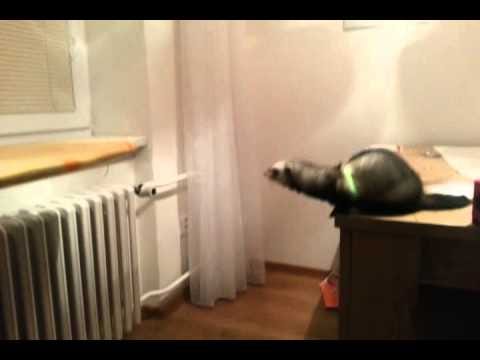Efficient teaching: improving student writing ability
Last week’s post was about university writing requirements that fall ludicrously short of their goal, like how this ferret falls short of his goal:
Let’s assume two facts:
We should expect good writing of our students.
Good writing comes from lots of experience with writing.
Which results in the following inference:
It is incumbent on us to require lots of writing from students in our classes.
This is not a small problem, because writing is not typically taught efficiently. If you’ve ever talked to people in English who teach composition, it sounds like a lot of work for the instructor, relative to the improvement in learning outcomes. How can we teach writing in an efficient way? This is a weakness of mine, so hopefully there will be a lot to learn in the comments. But here goes with my thoughts about the attempt to teach writing efficiently.
What makes people write well, more than anything else, is practice and revision. In addition, quality feedback matters.
Here is a thought: even people who don’t write well can often detect shoddy writing, and maybe even diagnose how to fix it. Even many amazing writers need other people to edit their own work, as they simply lack the independence of perspective needed to find the flaws.
Are we able to be more effective editors than the students in our classes? I would think so. But perhaps, with the proper guidance, students can become effective editors of one another’s writing? Moreover, do students have the opportunity to learn more about writing from the process of editing other people’s work?
Is it possible to teach writing well without needing the instructor to edit fresh writing on a frequent basis?
How about we design assignments — lab reports, short essays, term papers — in which students revise one another’s work? Instead of editing a stack of papers, we can review edits of edits. What really matters is that students are writing and getting good feedback. There’s no rule that the feedback has to come from us. If we provide both guidance and expectations for quality editing, then students should be able to do good peer edits and evaluations. I hope.
In a comment on the first teaching efficiency post, I explained a writing exercise I did with my class. I had the class read – in class over just five minutes — a short and well written piece. (Erwin’s classic paper in the Coleopterists Bulletin). I had the students discuss in small groups to identify the characteristics of the writing that made it good writing, and they reported back and we had a small discussion about it. Then, I took a piece of somewhat okay anonymous student writing from another time and place, and projected it for the class. With everybody watching, I modeled the editing process in google docs and showed them how and why I made a score of changes to improve it. I let them interrupt me with questions or suggestions as we did it. Then, groups of four were asked to create a single google doc and did their own writing and editing simultaneously.
Having students work together to develop and edit a single written document was a valuable lesson for everybody involved. I haven’t taught much writing since that semester, but when I do, I’d like to continue working with students to give them opportunities to edit one another’s writing and make sure that I have a grading structure in the class that rewards both writing and editing.
The difficult part of this plan is to keep an intentional focus on writing. It’s one of the most important and most overlooked parts of a university education, and like most other instructors, other things can seem more important at the moment. In insect biology, building and curating a collection is a big focus. In non-majors laboratory, I want to focus on experimental design and the fun of science, rather than nitpicking the writing of lab reports. In biostatistics, concepts and problem-solving come up front. Regardless of the content, it’s easy to see how writing could get shunted to a tier of lower priority, even though it’s fundamental.
Do you include a substantial writing component in your courses? If so, do you have approaches that work without taking all of your time away?


